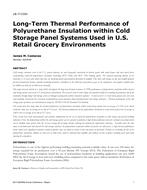Cold storage structures used in the U.S. grocery industry are most frequently constructed of discrete panels with wood frames and sheet metal facers encapsulating closed-cell polyurethane insulation containing HCF 245fa and HCF 134a blowing agents. The expected operating lifetime of the enclosures is 12 years after which time they are decommissioned and primarily discarded in landfills. This short cold storage use life and landfill disposal practice prematurely destroys valuable insulating materials, contributes to the build-up of greenhouse gases in the atmosphere, and requires landfill space for millions of cubic feet of solid waste annually.
This paper presents details of a study which investigates the long-term thermal resistance (LTTR) performance of polyurethane insulation within discrete cold storage panels used in the US retail grocery environment. The research seeks to better define the potential benefit of extending the productive life of the insulation through longer cold storage service or through recycling into another insulative material. A total of ten U.S. retail chain grocery store sites were semi-randomly selected for the extraction of polyurethane panel specimens from decommissioned cold storage structures. Thermal performance of the cold storage panel specimens was determined by using the ASTM C518-10 Standard Test Method.
The results from this study show the thermal performance of polyurethane insulation within tested freezer panels lost an average of 1.55% of its initial insulative value over an average in-use life of 11.4 years. The thermal performance of the polyurethane insulation in tested cooler panels lost an average of 5.86% over an average in-use life of 12.7 years.
These results have both environmental and economic implications for the use of closed-cell polyurethane insulation in cold storage and general building industries. First, the polyurethane within the cold storage panels can be expected to perform at high thermal efficiency levels for extended use periods which can be multiple times greater than the 12-year average life of today; thereby reducing the demand for replacement enclosures. Secondly, when the time comes to decommission and discard the cold storage enclosure, the polyurethane insulation within the panels can still possess a high thermal performance which could create significant insulative benefit if effective ways are found to recycle it into new forms of insulation. Finally, by extending the life of the polyurethane insulation, millions of cubic feet of solid waste could be diverted from landfills and millions of tons of global warming gases kept from entering the atmosphere.
Citation: 2017 Annual Conference, Long Beach, CA, Conference Papers
Product Details
- Published:
- 2017
- Number of Pages:
- 8
- Units of Measure:
- Dual
- File Size:
- 1 file , 620 KB
- Product Code(s):
- D-LB-17-C024
